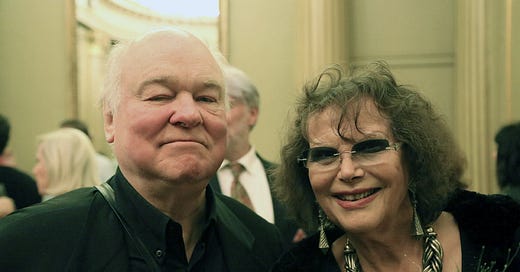A friend asked me recently to write this appreciation of the actress Claudia Cardinale. I’m sure he won’t mind me sharing it.
With Claudia Cardinale. A recent photograph.
Is there a more radiant moment in the western than that where Claudia Cardinale alights from the train in Sergio Leone’s Once Upon a Time in the West? A little ridiculous in her straw hat, she’s initially lost in the bustle of other passengers, the strangeness of some Native Americans filing stoically past. Even the hands of the station clock don’t agree with those on the tiny watch on her wrist. It’s as if the next gust of desert wind will blow her away. But then a few notes of a lone and wordless female voice signify her growing resolve. With each step increasingly in charge, she strides ahead, two boys in her wake struggling with her bags, and, passing through the station building, steps out into her new life while Tonino Delli Colli’s camera and Ennio Morricone’s music soar above our heads.
Few performers do entrances as well as Cardinale, and this is one of the finest. To it, one could add her radiant first appearance in Visconti’s The Leopard, once again her own woman, sailing through the gaping men in the prince’s salon to pay her respects to the senior woman in the room, and the moment in Otto et Mezzo, where she appears at the spa to Marcello Mastroianni’s jaded film-maker. Fellini was not a director of women, for whom he had little time on or off the set, but for Cardinale he made an exception. In this film, she becomes the embodiment of hope, a manifestation of the feminine purity and joy in which Guido Anselmi has almost ceased to believe.
The same quality enchants young Jacques Perrin in Girl with a Suitcase, the deranged Mastroianni in Henry IV, and the men in any other of her performances one cares to name: grizzled mercenaries Burt Lancaster, Lee Marvin and Woody Strode in The Professionals; Jean Sorel in Visconti’s operatically over-wrought Sandra; as the puzzled young wife to an impotent Mastroianni in Il Bel’Antonio, and, among the most memorable, the gypsy thief Vénus opposite Jean-Paul Belmondo’s swashbuckling brigand in de Broca’s Cartouche. When her character is killed in that film, something is extinguished in the men who love her. Having draped her in jewels and reverently lowered her body into the river, sole passenger in a golden coach, Belmondo says quietly to his followers “Now to die, and quickly.” Nobody disagrees.





The combination of her and the Morricone score is cinema alchemy. And all without a word spoken. Love her.
A wonderful appreciation of a STAR!. Thank you John on behalf of those who will be moved to attend the mini-homage to CC in Sydney... Geoff